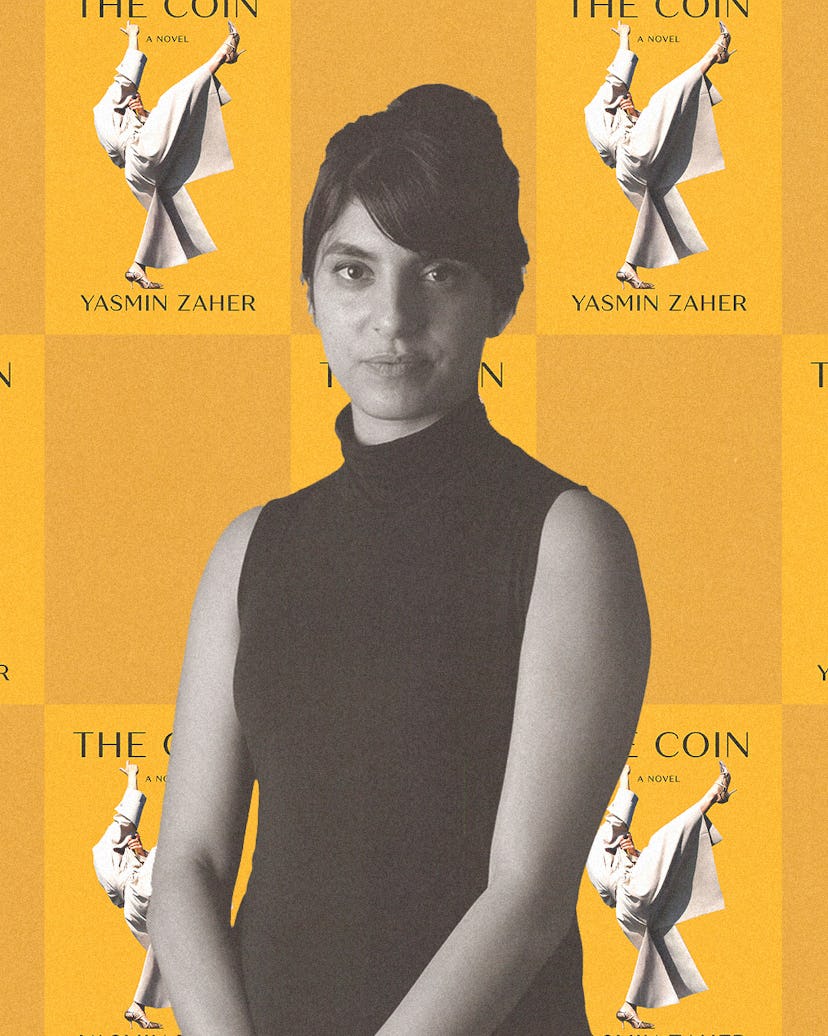In The Coin, Yasmin Zaher Spins a Messy Fashion Tale With Heart
The author discusses introducing audiences to a layered Palestinian protagonist and why writing is all about intuition.

Yasmin Zaher never intended to write her debut novel, The Coin. The sprawling tale of a Palestinian woman seeking peace of mind—and her best life—in New York City came to the author in unexpected bursts of inspiration. The narrator, whose name we never learn, struggles with grief, pushes boundaries at her middle school teaching job, and eventually links with a questionable character who’s illegally hawking Hermès Birkin bags. Through it all, readers watch (and can likely relate to) the main character, who searches for answers in her closet, where she’s got a vast designer wardrobe.
The Coin also sees the narrator exploring nature, turning over existential musings in her mind: How can the desire to feel good, feel whole, and soothe inner wounds lead someone in search of relief? While Zaher meditated on these questions and mapped out the character’s arc, structuring her free-flowing ideas into a cohesive novel proved to be an exercise in perseverance. “It taught me that I have a certain kind of perseverance in what I believe in—my true desires and true dreams,” she says, reflecting on what writing the novel taught her. “That’s been a positive discovery about myself.”
W caught up with Yasmin Zaher while she was in Paris to discuss the key piece of writing advice that guided her story, and balancing specificity with the universal.
The premise of this story feels so fresh. Was the idea knocking on your door for a long time?
No. On the contrary, I didn’t really know what I was doing. I was just writing some sections and one page turned into five pages, five turned into 20 pages. And probably around 30 pages, I realized I was excited to write more and more. In the beginning, I thought it would be a novella.
That seems like a more pleasurable way to write a book, rather than focusing on daunting deadlines and word counts.
There’s something exciting about not knowing where you’re going, because you surprise yourself in the process. I don’t know if I’ll be able to experience that degree of freedom and writing out of impulse in my next project.
We never learn the name of the narrator at the center of The Coin. What went into that narrative decision?
It wasn’t really a choice. Usually when I write, the name of a character comes to me immediately. Trenchcoat, Sasha, and Curls all came immediately. I couldn’t find a name for the narrator that satisfied me, so I decided to leave her nameless. Because it’s in first person, it worked. Now that I have real readers, I find that people see meaning where I didn’t necessarily intend for meaning to be. But that’s part of the charm of a work of art.
How did nature come to play such a significant role in the novel?
I find that I’m my best when I’m in nature. I think the character also has a vague awareness of that fact as well, and is trying to find her best self. At some point she suspects that she will find it in nature. There’s a lot of yearning in the novel—a lot of yearning for Palestine, and a lot of yearning for nature as well.
Was it the reprieve from performing and being able to just be that made nature a place of solace for the character?
Yeah, that’s exactly it. It’s being without pretense, without performance. What does a tree care what the hell you’re wearing? For all it cares, you could be naked. There’s something very consoling about that, when you come from a society where you are constantly being looked at and judged.
Can you talk about how you approached balancing the specificity with the universal—like highlighting the character’s Palestinian heritage and grief about the tragedies happening in Gaza, but also painting a relatable picture of a person in New York City just trying to figure it out?
The world is very familiar to a western audience. It’s New York City, it’s contemporary. It could be like some scenes out of Sex and the City that we’ve all seen millions of times. But for many readers it may be the first time they’ve come across a Palestinian protagonist. There’s something about that marriage of the familiar and unfamiliar that makes it easier to enter her mind, because not everything is new for the reader. There are things that they can relate to—that makes them more open-minded toward reading about unfamiliar things. But none of that was intentional. I just followed my intuition.
Is that a piece of advice for the reader who feels inspired to write their own creative work after reading The Coin?
That’s definitely the advice. Follow your intuition.